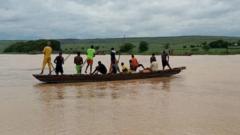In a move that could reshape the educational landscape in Nigeria, prestigious British boarding schools are expanding their influence by opening new campuses in Africa's most populous nation. Historically, affluent Nigerian families have sent their children overseas to attend top British institutions, drawn by the rigor of the British curriculum and the global opportunities it affords. Charterhouse made waves last year by launching a primary school in Lagos, with plans to unveil a secondary school soon. Similarly, Rugby School is set to begin offering secondary education this September, while other renowned institutions like Millfield and Wellington School explore opportunities in Nigeria.
While these developments have financial implications for Nigerian parents, there remains a strong appetite for high-quality, internationally recognized education that preserves cultural identity. "African parents value the international standing that British education provides while wanting to retain their children's African heritage," explains Ijay Uwakwe-Okoronkwo, founder of the Nkuzhi Learning Foundation in Abuja. This cultural balancing act is vital, especially as new schools navigate Nigeria's complex socio-political landscape, particularly in relation to LGBTQ issues.
Moreover, many families are deterred from sending their children abroad due to soaring tuition fees and the surging exchange rate, which has recently escalated from 500 naira to an alarming 2,200 naira per British pound. The establishment of these British schools in Nigeria allows families to access the same caliber of education at a fraction of the cost — for instance, while fees at Charterhouse UK hover around £60,000, its Lagos counterpart charges about £15,000.
With 90% of staff members in Lagos being locals and reduced operational costs compared to the UK, these institutions offer a synergistic approach that blends high standards with community involvement. However, experts speculate that while British schools might not drastically alter Nigeria's educational framework, they could pose a challenge to existing elite schools like the British International School in Lagos and The Regent School in Abuja.
Mark Brooks, an export champion for the UK, emphasizes the untapped potential of the Nigerian market, asserting, "Nigeria is the gateway to Africa. There is immense potential for British schools here." The growing trend may also influence the UK’s higher education sector, as challenges such as stricter visa regulations and high financial barriers deter Nigerian students from studying abroad. British universities may consider establishing a presence in Nigeria to meet demands while preserving international prestige.
For many Nigerian families, the prospect of British schools opening locally is both welcome and timely. “This has acted as an incentive to return home," shares Karima Oyede, a British-Nigerian whose children will transition into Nigerian branches of British schools this September. The growing collaboration between local and international education promises to create opportunities for Nigerian children that balance global standards with cultural integrity.





















